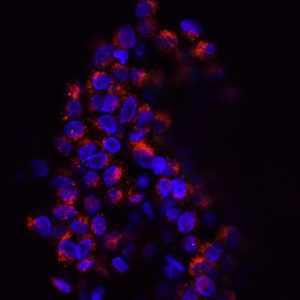Breast cancer is one of the greatest global health challenges we face today. In 2022 alone there were 2.3 million new cases of breast cancer in women around the world. 670,000 died from it.[1] Limited access to healthcare as well as outdated medical infrastructure can severely exacerbate this challenge. In poor countries where these drawbacks are prevalent most breast cancer cases are discovered at advanced stages, where there is little or nothing that can be done. Sadly, those patients for whom palliative care and treatment remain an option often remain untreated due to lack of treatment understanding.

In Developing Countries
Africa has the highest breast cancer mortality rate in the world. In fact, breast cancer is the most common type of cancer (27.7%)[2] in West Africa, where the mortality rate is the highest of all. That being said, the country with the highest breast cancer mortality rate is Fiji (Melanesia), followed by Barbados (Caribbean). In Africa, the countries with the highest rates of breast cancer-related deaths are Somalia and Mali. While most prevalent in women over 40, in some countries such as The Gambia, breast cancer is becoming more frequent – in fact, the second most frequent cancer after liver cancer – before the age of 25. Most frightening of all, these statistics may be skewed by under-reporting of breast cancer incidents, thus underplaying the burden of this disease in Africa.
Factors
Incidents of breast cancer have been on the rise in globally as well as in Africa. As modernization and urbanization settle into poor, transitioning countries, lifestyles can change dramatically. The sedentary habits and high-calorie diets, as well as the use of contraceptives and reduced periods of breastfeeding, are all more probable in urban settings and can increase a woman’s risk for breast cancer.

Solutions
Lack of breast cancer awareness and lack of screening infrastructure are two major factors in high mortality rates. In areas such as West Africa, women experiencing health problems, especially those related to reproductive health, are unlikely to seek assistance or medical care for a range of reasons including affordability, limited access, lack of knowledge, and cultural and gender barriers, meaning that by the time breast cancer is diagnosed there is little chance of recovery.
WHO identifies three pillars of breast cancer survival:[3]
- Early detection
- Timely diagnosis
- Comprehensive breast cancer management
Women in Sub-Saharan Africa and around the world need access to earlier and regular breast cancer screenings. They need access to modern facilities that have the ability to treat breast cancer patients – and not just breast cancer patients, because the treatments and management of breast cancer is the same as for other forms of cancer.
[B]reast cancer is a so-called index disease whereby pathways are created that can be followed for the management of other cancers.
— World Health Organization (WHO)
These three pillars, however, need a strong foundation, and that is awareness. Sadly, even in places where there are programs in place, some women diagnosed with breast cancer do not seek out treatment due to a lack of understanding, or for fear of the cost.

For many developing countries mammographic technology may not be practicable, but that does not mean early detection is impossible. Awareness campaigns can teach women and their families the importance of early detection, the signs to look for, and the importance of treatment. If there is one, single factor that will improve the outlook for women facing breast cancer, it is awareness that can lead to early detection and treatment.
Donate Now to help Blackbird spread breast cancer awareness throughout West Africa!
Want to Know More?
Check out this 2023 paper by Dr. Linda Agbugba and Dr. Lopamudra Das Roy!
Or this 2022 World Health Organization article!
[1] https://www.who.int/news-room/fact-sheets/detail/breast-cancer
[2] https://www.breastcancerhub.org/breast-cancer/about-breast-cancer-africa
[3] https://www.who.int/news-room/fact-sheets/detail/breast-cancer
